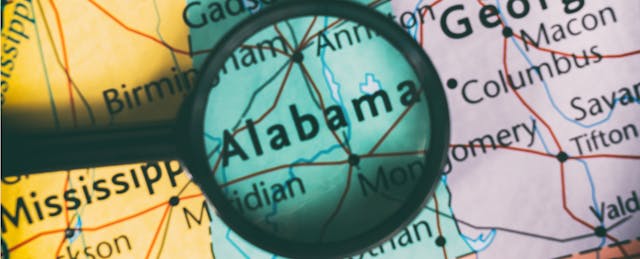Growing up in a rural farming community, Dr. Jodie Winship understood that education was important but, for many, not possible due to poverty, commitments to family farming businesses and a host of other reasons.
The first in her family to graduate from both high school and college, Winship is now Chair of Teaching and Learning and Chair of Instructional Leadership and Support at the University of West Alabama, striving to drive much-needed changes in rural education. She’s also part of a dream team of rural education experts leading UWA’s new online Doctorate in Rural Education degree program, launched in August 2018.
Winship’s team includes Dr. Jan G. Miller, Dean of UWA's College of Education, Dr. Reenay Rogers; Associate Dean of the College of Education and Director of Assessment and Evaluation; and Dr. B.J. Kimbrough, Dean of the School of Graduate Studies. All have expertise and experience in rural education.
The group created the doctoral program to help rural educators, administrators and community leaders address issues specific to rural education. Those include inequitable funding processes, a lack of real-life connections to classroom learning and insufficient research into the needs of rural schools.
“We’re experts at rural, so why not create a program that supports rural education and helps fill that research gap,” Winship says.
Offered entirely online, the program is completely full. And doctoral candidates vary from principals and curriculum developers to superintendents, but nearly 100 percent of applicants represent rural areas throughout the southeastern U.S.
Recognizing problems, finding solutions
“This is very much an applied program where you identify problems, and you solve them through the research process,” Miller explains. “We wanted our assignments and our courses to apply to day-to-day work and help identify problems and issues in rural education.”
Take, for example, an Alabama school district with the highest population of English Language Learners (ELL) in the state. The district enrolled a team of school leaders in UWA’s online rural education doctoral program. As part of their dissertation, they are researching solutions to the financial and curricular challenges of teaching ELL learners in a rural setting. These schools need professional development and materials for teachers and students, which, of course, requires funding.
“They’ve looked at the accountability model in the state of Alabama, and they are proposing a new funding structure to the state where each ELL student would get 1.4 percent of the money versus just 1 percent per student because these students need additional help and assistance,” Miller explains.
One Ed.D. student created a consortium of school districts focused solely on solutions for ELL students. Another doctoral candidate from a rural, low-income district created a food pantry so students in need could take food home to their families.
“Others are looking at topics like STEM education, teacher shortages, Career Technical Education and student achievement, through a rural lens and not trying to apply previous research done in urban areas to rural problems,” notes Dr. Rogers.
Connecting learning with communities
In addition to solving problems, the UWA rural education doctoral program strives to help create connections between students’ experiences in their rural communities and what they learn in the classroom. They do this through place-based learning—where educators use local geography and connections to create authentic and meaningful learning experiences for students.
Miller teaches a course called Place-Based Education and Service Learning. “What we’re finding is, in a rural area, teaching about where you live and utilizing the resources that you stand under each and every day is the best way to teach,” she explains. “If you’re going to talk about the rainforest and the rain, it doesn’t make a lot of sense to talk about the rainforest in countries far away. Let’s talk about the rain here, how we have to have rain and how we survive.”
Winship feels that place-based learning is key to engaging some rural students. "In our rural schools, we've got kids from families that are generational farmers. They ask, 'Why do I have to do all this math? Why do I have to do all this history stuff? I'm going to be a farmer; I don't need that.' With place-based learning, we can help them understand they need to learn these concepts to be smart farmers. Good crops don't come by chance. You can farm smart. You can take your product and distribute it smarter, or you can market it smarter."
She further explains that students can learn about budgeting, weather conditions, and even how to protect the ecosystem through hands-on, authentic learning experiences. They can see how these things directly affect the environment and the quality of life for communities.
Kimbrough says most educators enter the UWA doctoral program unaware of place-based education. During Miller’s course, students create a professional development session focused on place-based education for faculty and teachers at their home schools. After, many schools are so excited about the concept that they start implementing place-based units in their teaching right away.
Growing to meet student needs
As the program takes on its fourth cohort of students this January, it averages 25 to 30 new doctoral students each semester, with a total of 130 students currently enrolled. And interest remains steady after a rigorous admission process that accepts about 50 percent of applicants.
Despite its short existence, UWA’s online Doctorate in Rural Education program is expanding. The program began with two tracks: one for rural teachers and one for rural community and education leaders. In January, they added two additional tracks based on students’ needs: one focused on counseling and the other on higher education administration in rural communities.
Rogers says the program is meeting expectations even in its initial stages. "Everything we're doing is rooted in helping students find solutions to the problems in rural schools, and it's amazing how many of our students come back and say, 'I wouldn't have done this otherwise. Thank you for making me do this.' That's very uplifting."



